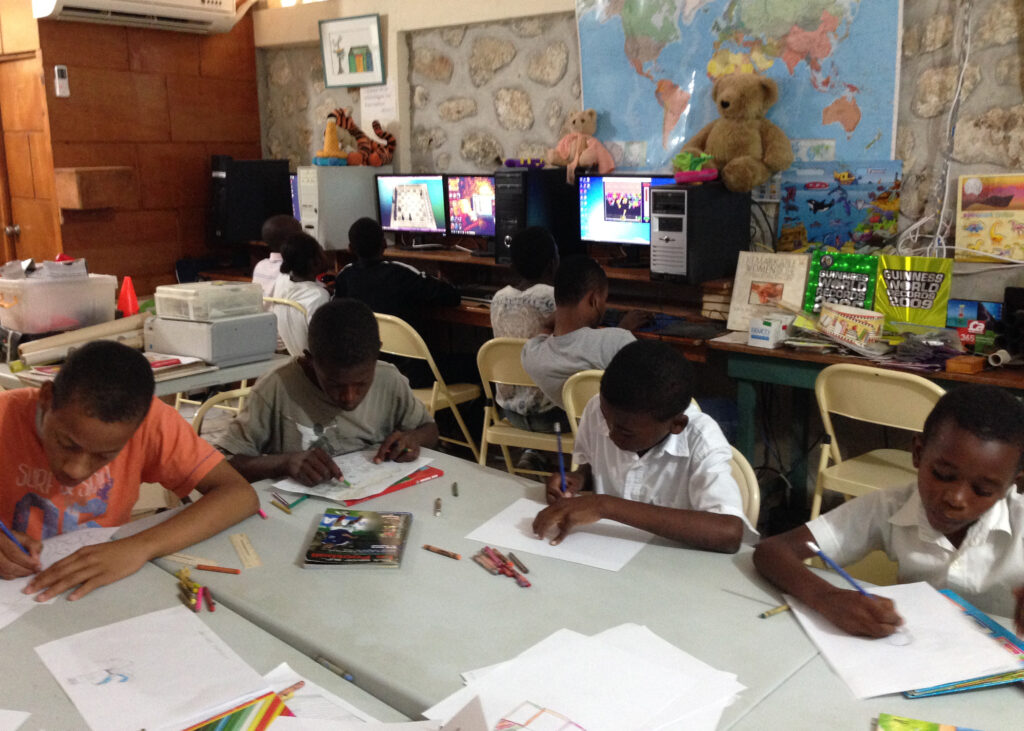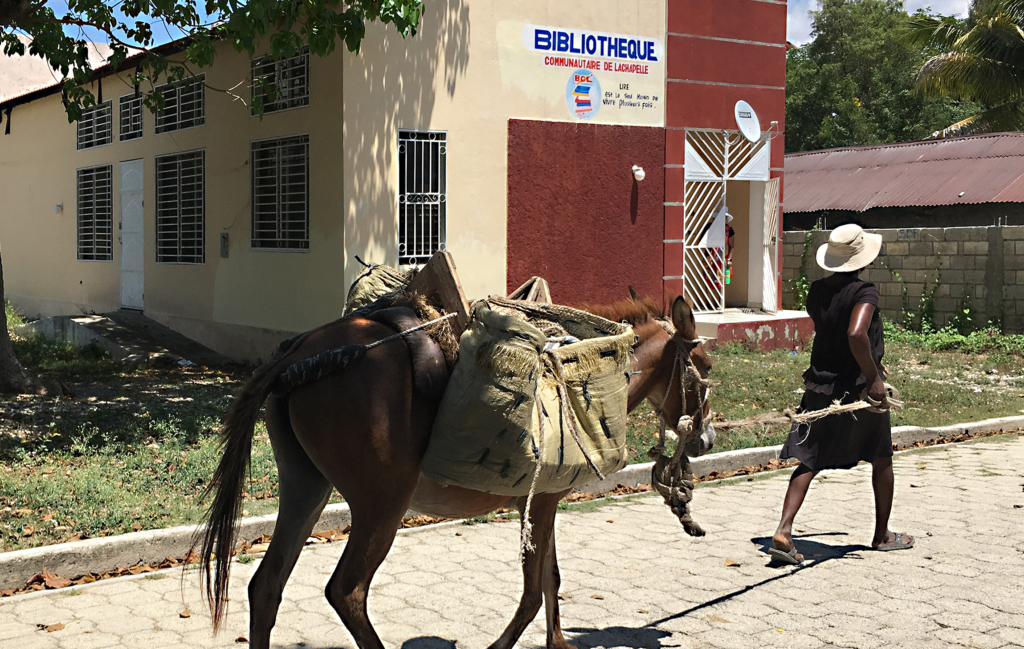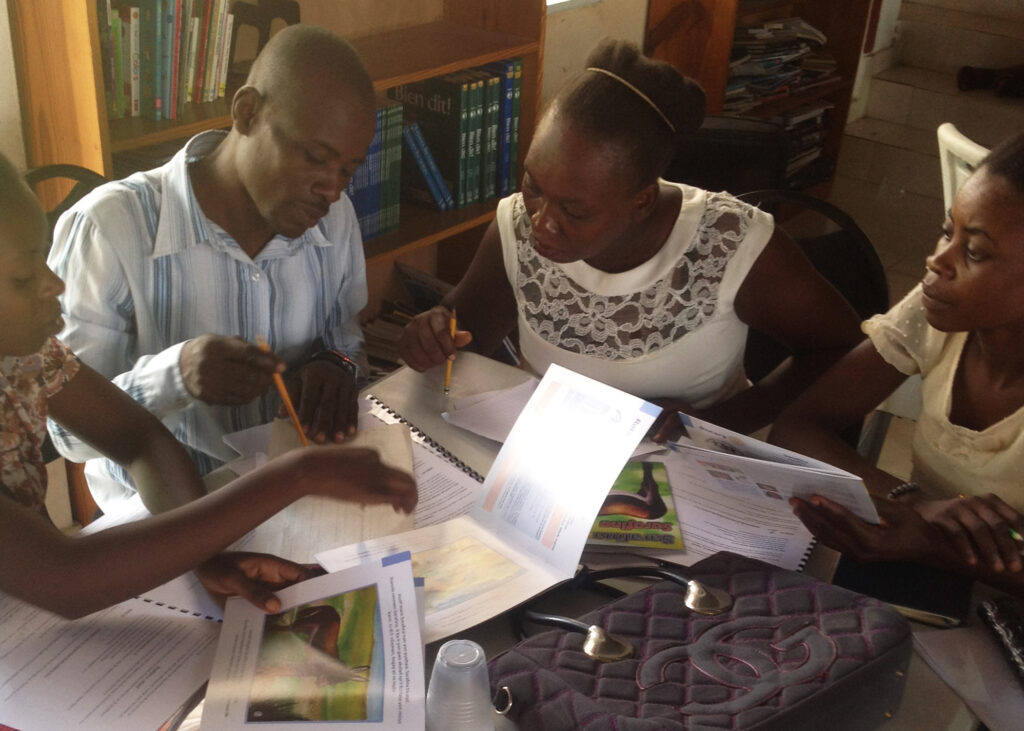
Partners in Literacy Haiti’s mission is to enhance reading through Kreyòl books, technology, and training focused on children (birth to 8-year-olds), families, and teachers in community libraries, schools, and centers. In advancing this vital mission, PILH hopes you will join us through by investing, collaborating, volunteering, supporting, for a national culture of libraries for underserved Haitian children.
Want to build a new library, upgrade your library, receive training, or team with us as library advocates for all children? Then contact us for more details and learn what’s possible to become involved.
Learn About Our Work
Our Children’s Libraries Strive to Produce these Characteristics
- Libraries with as many of these descriptors as possible:
- Provide high-quality, selected resources, information and tools, in all formats including digital ( if wi-fi is available)*
- Employ trained library workers or certified librarians to work with children birth through 8 years old and seek further training from those with library expertise*
- Assist older children (7-8), guide, and teach them to access and interact with different kinds of information
- Present a welcoming, safe, well-lit place for evening schoolwork for older girls and boys
- Create a variety of program and activities:
– offer text primarily in Kreyòl, but also in French, English language books and digital formats;
– include older siblings, parents or grandparents, if possible;
– plan multiple activities to encourage young people’s own creativity and productions (personal, artistic, experimental). - • Empower teachers and caregivers to expand classroom literacy practices*
- Engage with community leaders, work in partnership with schools, collaborate with NGOs working for development*
PILH Has Mentored these Libraries:

PILH’s primary role and interest is enhancing rural libraries by targeting, mentoring, and then providing partial funds for the most needed bulleted characteristics above that will strengthen the library services for its schools and community. Complete development can include library worker training, new and gently used books, computers, wi-fi connection, shelving, Kreyòl alphabet charts, pre-K teacher and library worker training. Unfortunately, as a young and growing nonprofit, we cannot meet all requests and must keep a waiting list for service.
Our Libraries receiving All [AS] or Partial [PS] Services:
1. Cange Community Library, Centre—[AS]
2. Summits Education Library System (40 primary schools), Centre—[PS]
3. Ravine Sèche Library Center, Artibonite—[PS]
4. La Chappelle Community Library, Artibonite—[PS]
5. Duplan Methodist Community Library, Quest—[AS]
The Haiti Library Alliance Partnership (group of 12 libraries)
Networking through Zoom on assorted topics – Mortenson Center for International Library Programs, University of Illinois Library and PILH
Our Partners in Co-Training
As our name Partners in Literacy states, we “partner” with knowledgeable organizations to provide expertise. Library workers from the following libraries have been involved with our training, especially when PILH personnel could not travel to the country due to unsettled conditions.
Library worker training
– Deschapelles Library–Besly Belizaire, head library worker1, trained by Terry Peterson, Sister Cities Essex volunteer, MLIS3
– La Chappelle Community Library—Fernand Constant trained by Janet Deavor, HEPI volunteer, MLIS
– Cange Library—Dr. Sara Mansbach, PILH Reading Specialist

Teacher training
– La Chappelle Community Library— Janet Deavor, HEPI volunteer, MLIS;
– Pastor Carlo Belon, Kreyòl Grammarian, School Director, Education Administrator;
– Dr. Peter Manual, Ret. Regional Education Supervisor, Rotary Club of Endeavor Bay, AU
– Dr. Sara Mansbach, PILH Reading Specialist
Complete library development with paid library worker assistance
– Dr. Sara Mansbach, PILH Reading Specialist
– Part-time PILH, Library Specialist consultant, Deb Spear (MLIS)
Networking presentations and workshops
Mortenson Center for International Library Programs, University of Illinois Library
– Dr. Clara M. Chu, Director and Distinguished Professor (PHD, MLIS)
– Partners in Literacy Haiti Dr. Sara Mansbach
– Librarians2 and library workers involved in the Haiti Library Alliance
Start a Rural Library—Preliminary Steps
Deciding to create a children’s library should always reflect the village’s strong desire to have this library and its willingness to invest time, effort and partial funding. If you want to work with PILH, you will need to fill out an application, undergo a Zoom or WhatsApp interview, and be selected by our PILH Review Committee.
Minimum requirements the village will be responsible for:
1) paying the library worker, [if possible PILH would like to help you interview an enthusiastic candidate]
2) must have strong WI-FI for ongoing Zoom or WhatsApp training sessions and village meetings,
3) establish a passionate, active and elected village Library Committee consisting of teachers and other educated village leaders.
4)develop and implement realistic and workable ideas for sustainability
You should be aware that a PILH library project focuses on children’s libraries for birth to 8-year-olds, but once functional will provide the foundation for a later, larger community library serving older students and adults, which will take more years to develop.
For further information, to partner with PILH, improve your library, attend a workshop, or join us as a library advocate, get in touch—we’ll answer your message as promptly as we’re able.
Definitions:
Footnotes
*critical to sustainability
1) Library worker—a person or assistant in charge of a Haitian library; this person is not officially certified or degreed in Haiti as it has no accrediting programs.
2) Librarian—a person who holds a certificate for a 4-year degree OR a MILS degree from an accredited higher education institution offering coursework in Library and Information Science.
3) MILS—a person who has a graduate school level degree as a Master of Library and Information Science from an accredited institution.